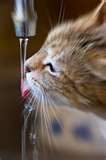Diabetes in Cats
There are several nutrients that can help prevent it from ever occurring
Diabetes in cats, also known as Diabetes mellitus or sugar diabetes, is caused by your cat’s lack of ability to metabolize sugar.
There is mounting evidence that several vitamins, including Vitamins C, D, and the B class can help in the preventive stages of diabetes.
There are two type of diabetes, and your cat can develop either form of this life-threatening disease, and it can affect any breed and any age group, as it does not discriminate.
Diabetes, however, will occur more often in middle aged and older cats, cats that are obese, and will also affect male cats almost twice as often as female cats.
If this disease is left untreated, it can have severe impacts on the overall health of your cat, and in the most severe of cases, coma will set in.
If this does occur this disease will cost your cat its life.
TWO TYPES OF DIABETES IN CATS
Diabetes Type 1 most always occurs because the pancreases of your cat is not producing enough of the hormone insulin.
Type 2 Diabetes, where your cat’s cells will not be responsive to the presence of insulin.
Diabetes in Cats is a disease that can best be described as preventing insulin that is needed for numerous functions in your cat, from passing to each cell.
If this occurs it will not allow glucose to enter into that cell.
Without this process, the valuable insulin sugar will remain in your cat’s blood stream and eventually passes into the urination tract and then leaves the body with the urine.
This will cause your cat to drink a lot more water due to the thirst requirements, and your cat will also be a lot hungrier because its body can not use the sugar in the blood.
As the diabetes progresses, there is a chemical called “ketones” that accumulates, which cause your cat to vomit frequently which causes more dehydration.
Diabetes in Cats is not a curable disease, but it is certainly a manageable disease if diagnosed, treated, and insulin is properly maintained.
If maintained, cats with this disease can lead very happy and normal lives.
There are numerous warning signs and symptoms that you can watch for for in this disease.
As described earlier, the two biggest warning signs will be an excessive thirst and with that an excessive amount of urination.
Because your cat is going through this battle, even though they will have an increased appetite, they will loss weight due to the dehydration it is suffering.
 A sudden loss of muscle is the biggest warning sign
A sudden loss of muscle is the biggest warning signTHE WARNING SIGNS
Cats, by nature, are very tedious and clean, so another warning sign is a sudden unkempt coat with your cat.
Along with this change in habits, they most likely will also appear depressed and very lethargic.
Because of gradual, or sudden in some cases, lose of weight, your cat will also start to lose their muscle mass which causes them to become weak, especially in their back legs.
Loss of Muscle
This losing of muscle or weakness in the back legs is the first symptom that cat owners should watch for.
It is the number one tell-tell sign that your cat may be developing Diabetes. Diabetes in Cats also has some unknown traits, as some cats may cycle in and out of a diabetic state.
Cats that have over a period of time appeared to be perfectly stable once they are diagnosed by your veterinarian and the proper insulin requirements have been met, may start to have a shift in the insulin requirements.
Insulin
Too little insulin will push your cat back into the original warning signs of a state of excessive drinking and urination, but too much insulin can produce an insulin overdose.
Insulin overdose can be life threatening to your cat and may cause your feline friend to go into shock.
You should immediately contact your veterinarian for the proper adjustments as they are the only qualified expert to make those adjustments.
Diabetes in Cats is a disease that will require your cat to eat a very regular and very controlled food intake, just like humans with the disease.
However, one of the toughest things about having a cat with diabetes, is finding the right insulin, and again, only your veterinarian can do that.
OBESITY
There are several theories about what causes Diabetes in Cats, but one thing is certain.
Obesity in your cat will be the number one potential cause.
The breed, the genetics, the gender, all seem to have no real bearing if a cat develops this disease or not.
Summary
The treatment of Diabetes in Cats should be left solely up to your professional veterinarian, as they will have to make the decision on the type of insulin.
As mentioned earlier, there is considerable evidence that Vitamins C, D, and the B classes can help with this disease, and cats would be no expectation.
Pet Medications for Diabetes in Cats
Cat Vitamin Store
Pancreatitis in Cats








